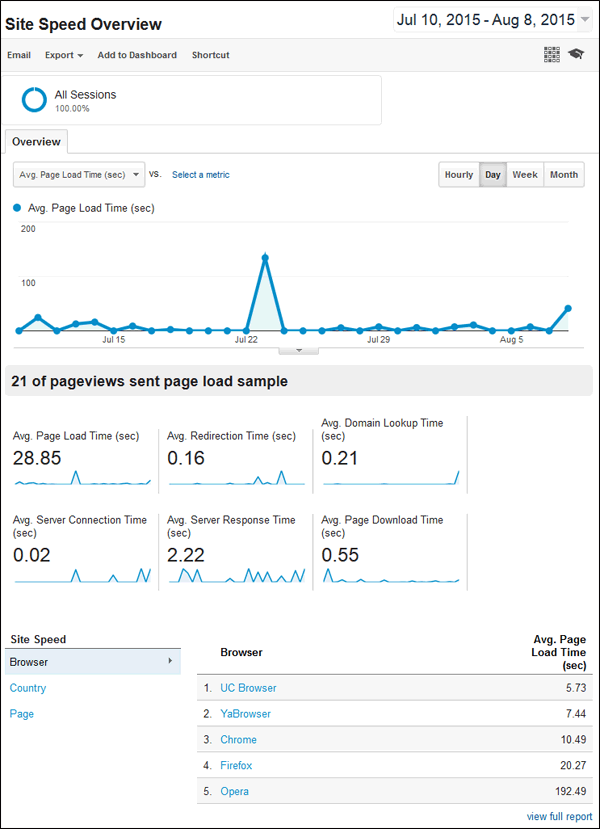
After writing about code and speed optimized websites in my #TBT last week, I wanted to bring your attention to Site Speed optimization tools that are built into Google Analytics.
As a quick recap, the speed of your website will help increase your website ranking a little bit, and when it comes to SEO, every little bit counts.
To get to them, you first log into Google Analytics then click on Behavior -> Site Speed -> Overview report as shown in this animated screen grab:

Here's a sample Site Speed Overview report:

The first thing you'll notice about this report is that it doesn't seem to report a site speed for every day of the last 30 days. This is to be expected; and it's a good thing, because this report shows you when your website was slow. You have a big problem if your website speed appears slow every day of the last 30 days.
The internet never runs perfectly, so there will always be days with tall spikes. The above report shows a tall spike on July 23, 2015. That spike represents a 134 second load time. That's a ridiculous load time that can only be measured if someone waited more than 2 minutes for the page to load. Unless this is a bizarre technology glitch, I will assume someone actually waited that long.
The above report also shows other page load time spikes on these days:
* 24 second spike on July 11
* 13 second spike on July 13
* 16 second spike on July 14
* 11 second spike on August 3
* 41 second spike on August 8
These are not average load times for those days, but individual anomalous load times for single users on those days. You can see that the repot says "21 of pageviews sent page load sample." That's a miniscule sample size of the 5075 pageviews that this website had in the last 30 days.
Even though the sample size is small, it's a good idea to try and figure out what might be causing those spikes. Some potential causes are:
1. Server load from too many users
2. Server load from a large database request
3. Server load from a backup routine
4. ISP slowdown unrelated to the website
5. Internet slowdown unrelated to the website
6. Denial of service attack against the website
7. Denial of service attack against the website hosting company
Of these 7 potential issues, and there are others, it's only the first 3 that you could do something about. What can you do? Simply pay for a larger and faster hosting provider.
Domain Name Lookup Spikes
The speed of your website and web host is not the only factor that controls your website speed. Every website is connected to a Domain Name Server that translates your domain name into the machine readable numbers that connect the entire internet together. They are called IP addresses.
You are required to have two Domain Name Servers (DNS) that provide name-to-number translations for your website. Two is good, three is better, and four would be fantastic if you can get them. If your DNS malfunctions, it will slow down your website a lot. You can speed up the Average Domain Lookup Time by paying for extra DNS services.
Below the main chart above I'm also showing 6 smaller charts. One of them shows an "Avg. Domain Lookup Time" of 0.21 seconds. Clicking on that little report reveals that there was a 3.8 second spike in the domain name lookup time on August 8th. This was a one-time spike in the last 30 days which I would attribute to a brief hiccup in the internet.
I would be more concerned if there were additional spikes throughout the month because that would hint at a malfunctioning DNS.
Server Response Time
How much could you speed up your website if you had a faster server? Faster servers always cost a lot more money, which might be worth it if your website needs the extra horsepower.
Another one of the small charts below the main chart shows the "Avg. Server Response Time" as 2.22 seconds. Clicking that chart reveals that the slowest response time of 3.8 seconds was reported on July 27th.
That means it took 3.8 seconds for the server to first reply once someone requested a page. The same 7 issues listed above for the pageview loading slowdown might also be contributing to why the server is taking so long to reply
Bottom Line
Users like fast websites. Exactly how fast is subjective. I've heard different reports that a website needs to load in 3 seconds, or 7 seconds, or even as much as 11 seconds. Who's right? What's your own opinion? How many seconds do you wait before getting upset at a page load time?
There are a lot of components that make up your website speed. The DNS I mentioned above is something you don't necessarily have control over.
Your website software will contribute in a big way to the speed of your website. If you're using large systems like Joomla, Drupal, or Magento you will need a fast hosting environment to begin with. Other systems are inherently designed with speed in mind.
Although Google says that site speed is a small ranking factor, you should not worry so much about the ranking benefits; concentrate on the faster user experience instead.








